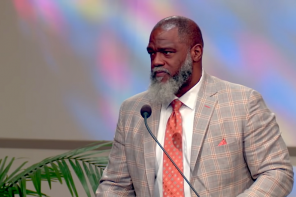Annie Lobért knows that sex sells. The 16 years she spent as a stripper, prostitute, and high-class escort, most recently on the Las Vegas Strip, taught her that. And although she’s been out of the game for years, has since accepted Christ and gotten married (to Oz Fox, lead guitarist for the Christian metal band Stryper), Lobért appreciates the allure of her former lifestyle. Calling herself a hooker for Jesus, she has set out to “hook, help, and heal” those still in the industry.
Lobért, a curvy peroxide blonde, has been unabashed in flaunting her God-given gifts to draw attention to her Vegas-based ministry, Hookers for Jesus. At the 2008 Adult Entertainment Expo, for example, a 40-year-old Lobért (dressed in a tight black tank top with strategically placed pink letters spelling “HOOKERS” above a silver ichthus) confronted some of the industry’s most renowned promoters alongside Heather Veitch, a former stripper with a ministry of her own. While their message wasn’t particularly well-received by the adult filmmakers or the stars who work for them, Lobért and Veitch had no trouble finding fans among the expo’s 40,000 visitors.
“Some Christians Think We are Just Cheap Harlots”
“A lot of guys pose for photos with us and when they go home and look up what’s on our T-shirts, they learn what we’re about,” Lobért explained to Telegraph reporter Philip Sherwell. “We call it booby-trapping.”
But those who attend adult entertainment fairs aren’t exactly Lobért’s target audience. Her conspicuous appearance is also meant to attract the other women posing for photos and signing autographs, the women outside and in the casinos, the women working the Strip—the women she is trying to save.
“The girls can relate to who we are and how we look in a way that they can’t with some of the typical frumpy Christians who come here,” Lobért told Sherwell. “We don’t preach to them and we’re not judgmental. We tell them that God loves them, even if they are hookers or strippers or porn stars. We offer help and advice—we do whatever we can for them.”
Last December, cable viewers got a taste of what it might be like to minister in “America’s prostitution capital” in the three-part series Hookers: Saved on the Strip. The show, which aired on the crime-and mystery-focused network Investigation Discovery, profiled Lobért and Hookers for Jesus and, in true reality docudrama fashion, the personal stories of three women who have been “saved.”
In a segment she calls “Saturday Night Love,” Lobért brings her “takes one to know one” attitude to the Strip, boasting that she can spot a working girl anywhere. Equipped with gift bags full of beauty products and Bibles, she offers support and encouragement, and an invitation to church.
“I’m serious about this,” she tells one woman who stuffs Lobért’s business card into her bra. “God really does love you and he loves girls like us. And you know what? You don’t have to quit working. You can come to church. Just like you are.” Despite their sincere efforts, Lobért and Hookers for Jesus have drawn their share of criticism. “Some Christians think we are just cheap harlots and tell us so,” she says. “But to be honest, we really don’t care.”
Even the television show, which begins with a warning about its potentially disturbing content, seems to favor sex over religion, the hookers over Jesus. “The parts that you will see is what [Investigation Discovery] chose to portray,” Lobért explained to The Christian Post:
“There are a lot of things that you will not see that you’re just going to have to trust, if you are a Christian watching, that we are doing this for God. It is a show about redemption and restoration in Jesus Christ.”
While the network almost certainly did some selective editing, the explicitly sexual nature of Hookers: Saved on the Strip, and of Lobért and her project in general, is a good example of a peculiar paradox: the evangelical tendency to use graphic language and imagery when discussing—and especially when condemning—sexual issues and activities. From abstinence education to exhortations against masturbation to bedroom advice for married couples, a range of books, websites, and even sermons, examine sex in vivid detail.
This approach may seem counterproductive but, as historian Dagmar Herzog has noted, “evangelical sex advice lures and tempts and arouses—all in the name of Christ. It does so in order to argue that not only non-marital sex but also masturbation and fantasy stunt emotional growth, destroy souls, and devastate marriages. This has been its overt message, but to get that message out as forcefully as possible, evangelical sex experts now engage in their own version of Christian pornography.”
In a scene from Saved on the Strip, Lobért characterizes porn as a “gateway drug” to prostitution, blaming both producers and addicted consumers for the plight of many of the women working the Strip and elsewhere, by addressing viewers in the confession cam setting that has come to define reality television.
“Each time you do it, you want more. More of that rush, more of that crazy feeling.” Cue the music, cut to a close-up of a woman pulling on fishnets and fastening stilettos. “It’s suggestive.” She continues, fighting back tears and yelling: “It ain’t right. It’s not fair. It’s wrong. To sell sex with porn, and to get people addicted so that now guys have to act out their fantasy and call us. And then we get blamed for their addiction!”
Cut to the fishnets.
Conflating Prostitution, Sex-Trafficking, Slavery
Annie Lobért grew up in a middle class family on a tree-lined street in Minnesota. Her upbringing was strict, and she hated the rules that her mother and her father and the church imposed on her. “So naturally when I hit the age of a teenager,” she told Joy Behar in a television interview, “I just went wild.”
Lobért did drugs and she slept around. She was insecure and felt unloved, so she started stripping to prove her worth. And before long, she fell in love with a regular customer who, after they moved to Las Vegas, eventually became her pimp. “I never knew when I got older that I would be a prostitute,” Lobért says. “I wanted to be like the stars. I wanted to have happiness like they did… I thought the casinos looked so beautiful, the glamour and the glitz of it all, the showgirls and the shows, and the movie stars… that was so alluring to me.”
During her time in the industry, Lobért certainly experienced the glamour and the glitz, the money and the cars and the jewelry. But she also faced the threats and the suffering, the violence and the oppression, that come with the job. She tells stories of being beaten and abducted, and of how she still lives in fear.
It is understandable, then, why Lobért might consider prostitution a form of slavery and think of all sex work as trafficking. It is understandable, but it is also imprecise. By using and emphasizing these terms, Lobért and her Hookers for Jesus ministry conflate coercion and consent, leaving little room for alternative narratives and divergent circumstances. Growing up in middle-class America and making a choice, however misguided, to enter the sex industry stands in stark contrast, for instance, to being sold, transported, and forced into the industry as a child. The point is not to trivialize prostitution-as-choice, or to ignore the effects of coercion, but rather to point out the realities indicated by the terms ‘slavery’ and ‘trafficking.’
Benjamin Skinner, author of A Crime So Monstrous: Face-to-Face With Modern-Day Slavery, addressed the issue in a 2008 interview with Mother Jones. “For the record, I think prostitution is always degrading and exploitative and it is often brutal, but it is not always slavery,” he said. “Those [including many evangelicals] who argue that it is, however well-meaning they may be, are doing tremendous damage by diminishing the suffering and pulling attention away from the millions of people in the world who are slaves, not to mention those who are genuinely enslaved in prostitution.”
The issue of sex trafficking has been a central evangelical concern for more than a decade. Led by Michael Horowitz, a neo-conservative scholar at the Hudson Institute, a coalition of evangelicals including Chuck Colson (joined improbably by a group of feminists who had already been championing the cause) pushed for legislation that would eventually become the Trafficking Victims Protection Act (TVPA) of 2000. While these proponents fought in vain for a broad definition of trafficking that would include “voluntary” prostitution, they succeeded in another section of the bill that refers to all commercial sex acts as sex trafficking. And, perhaps unsurprisingly, the coalition also embraced a limited interpretation of victims as women and children.
Many see this effort, and particularly the religious right’s leadership on the issue, as enabling a moral crusade. “They’re not trying to liberate women, or trying to let them control their own destiny,” Chip Berlet at Political Research Associates, a nonprofit that tracks right-wing networks, commented. “They’re trying to stop women from sinning.”
It is important to note, however, that not all evangelicals committed to countering sex trafficking are as politically conservative, or even as overt, as Horowitz and his allies, for whom the trafficked woman becomes a symbol of moral decay and grounds for speaking out against issues such as pornography, homosexuality, and abortion. For other evangelicals, the matter is often one of several social justice issues—like the environment and poverty—that they are dedicated to addressing.
But Lobért’s own motive for employing the trafficking and slave labels seems just as much about a quest for personal absolution and recognition as it is about saving women from sin or raising public awareness. When it’s ‘prostitution,’ no one wants to talk to you, but it’s the same thing,” she told Salon writer Tracy Clark-Flory. “You’re being trafficked. You’re being enslaved. You might not see the chains, but they’re there.”
The Sins Have All Been Confessed
Lobért wants her audience, and maybe also God, to know her experience wasn’t her fault. At least not all 16 years of her experience. She was coerced, she was forced, she was threatened. She couldn’t leave. Her account is certainly moving, and it also makes for a great born-again redemption story.
The precise details of Lobért’s ultimate escape from her former lifestyle are unclear but two things are certain: she overdosed and she found Jesus. It was only after a mix of cocaine, Xanax, Oxycodone, and other drugs gave her a near-fatal heart attack that Lobért prayed and asked God for help. And she’s been working the Strip, as a Hooker for Jesus, ever since.
In a 2009 interview with Religion Dispatches, Dagmar Herzog highlighted a central feature of Annie Lobért’s project, of Hookers for Jesus and Hookers: Saved on the Strip. “Evangelical advice-givers like to brag about the wild promiscuity of their youth, and their many adulterous misdeeds, or to confess in anguish the abortions they forced on girlfriends or the porn they once so frequently indulged in, before moving on to advise others how to get onto the straight and narrow.” Not only is it titillating, she explains, but also it preempts any malicious efforts to uncover past sins.
“There’s nothing to expose,” Herzog says, “the sins have all been luxuriously confessed.”




